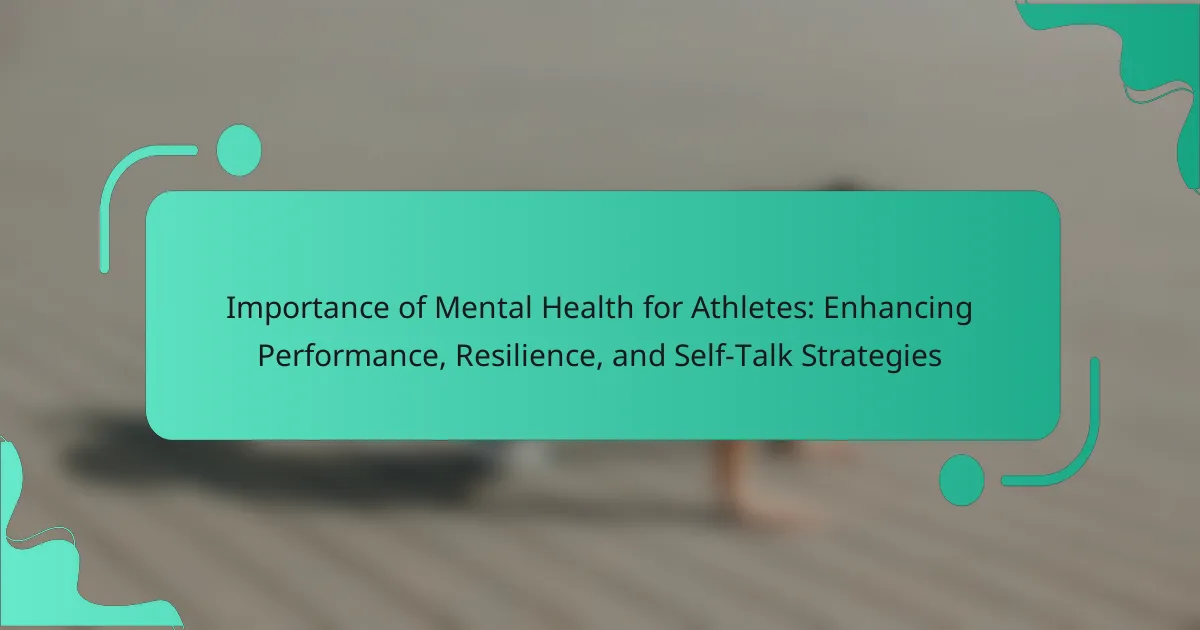Mental health is crucial for athletes, directly impacting focus, motivation, and resilience. This article explores how strong mental health enhances performance, improves self-talk strategies, and fosters effective coping mechanisms under pressure. Research highlights the correlation between mental well-being and physical outcomes, emphasizing the benefits of practices like mindfulness and visualization. Prioritizing mental health can lead to better performance metrics and long-term success in sports.

How Does Mental Health Impact Athletic Performance?
Mental health significantly impacts athletic performance by influencing focus, motivation, and resilience. Athletes with strong mental health demonstrate enhanced performance, improved self-talk strategies, and better coping mechanisms under pressure. Research indicates that mental well-being correlates with physical outcomes, as athletes with positive mental states often achieve higher levels of success. For instance, studies show that athletes who engage in mental health practices, such as mindfulness and visualization, report lower anxiety levels and greater overall satisfaction in their sport. Prioritizing mental health leads to improved performance metrics and long-term athletic development.
What Are the Key Components of Mental Health for Athletes?
Mental health is crucial for athletes as it enhances performance, resilience, and effective self-talk strategies. Key components include emotional regulation, stress management, and mental resilience. Emotional regulation allows athletes to maintain composure during high-pressure situations, while stress management techniques help mitigate anxiety and improve focus. Mental resilience enables athletes to bounce back from setbacks and maintain motivation. Additionally, positive self-talk strategies foster confidence and reinforce a healthy mindset, ultimately contributing to overall athletic success.
Why Is Self-Talk Crucial for Athletic Success?
Self-talk is crucial for athletic success as it directly influences mental health, performance, and resilience. Positive self-talk enhances focus, boosts confidence, and mitigates anxiety during competitions. Athletes who engage in constructive self-talk report improved performance metrics, demonstrating its unique role in mental preparation. Techniques such as affirmations and visualization can further enhance these effects, making self-talk a vital strategy for athletes seeking to optimize their mental approach.
What Types of Self-Talk Exist in Sports?
Self-talk in sports generally falls into three types: motivational, instructional, and negative. Motivational self-talk boosts confidence and energy, while instructional self-talk focuses on technique and strategy. Negative self-talk can hinder performance and should be addressed.
How Does Positive Self-Talk Enhance Performance?
Positive self-talk significantly enhances athletic performance by improving focus and confidence. Athletes who engage in positive self-talk report higher resilience and reduced anxiety levels. This mental strategy fosters a growth mindset, enabling athletes to overcome challenges and maintain motivation. Research shows that effective self-talk can lead to improved outcomes in training and competition, reinforcing the importance of mental health in sports.
What Role Does Resilience Play in Athletic Achievement?
Resilience significantly enhances athletic achievement by improving mental health and performance. Athletes with high resilience can better cope with stress, setbacks, and pressure, leading to consistent performance. Research indicates that resilient athletes demonstrate superior self-talk strategies, which further bolster their confidence and focus during competition. This mental fortitude allows them to maintain motivation and adapt to challenges effectively. Ultimately, resilience is a key factor in achieving sustained athletic success.
How Can Athletes Build Resilience Through Inner Dialogue?
Athletes can build resilience through inner dialogue by fostering positive self-talk and reframing negative thoughts. This practice enhances mental health, leading to improved performance. Studies show that athletes who engage in constructive self-talk experience lower anxiety and increased focus. By regularly practicing affirmations and visualizations, athletes can reinforce their mental strength and adaptability.
What Are the Universal Benefits of Effective Self-Talk?
Effective self-talk enhances mental health for athletes by improving focus, confidence, and emotional regulation. It fosters resilience by promoting a positive mindset, which is crucial during high-pressure situations. Research indicates that athletes who engage in constructive self-talk experience reduced anxiety and improved performance metrics. Additionally, effective self-talk strategies can lead to better decision-making and increased motivation, ultimately contributing to overall athletic success.
What Unique Strategies Can Athletes Use for Self-Talk?
Athletes can enhance self-talk by using unique strategies such as positive affirmations, visualization techniques, and mindfulness practices. Positive affirmations involve repeating constructive statements to build confidence. Visualization techniques help athletes mentally rehearse optimal performance scenarios, reinforcing a success-oriented mindset. Mindfulness practices allow athletes to stay present, reducing anxiety and improving focus. These strategies contribute significantly to mental health, resilience, and overall performance enhancement.
How Do Visualization Techniques Complement Self-Talk?
Visualization techniques enhance self-talk by creating vivid mental images that reinforce positive affirmations. This combination improves focus, builds confidence, and fosters a resilient mindset. Athletes often use visualization to mentally rehearse performances, which complements self-talk by aligning thoughts with desired outcomes. As a result, athletes experience heightened motivation and reduced anxiety, ultimately enhancing their overall mental health and performance.
What Are the Best Practices for Developing a Positive Inner Dialogue?
To develop a positive inner dialogue, athletes should practice self-compassion, set realistic goals, and engage in positive affirmations. These strategies enhance mental health, boost performance, and foster resilience. Self-talk influences motivation and emotional regulation. Regularly reflecting on successes and maintaining a growth mindset can further reinforce a constructive inner dialogue.
What Rare Challenges Do Athletes Face with Self-Talk?
Athletes face rare challenges with self-talk that can hinder their mental health and performance. Negative self-talk can lead to decreased confidence and increased anxiety, impacting their resilience. Additionally, athletes may struggle with the pressure of public expectations, which can distort their self-perception and lead to harmful thought patterns. Addressing these unique challenges through effective self-talk strategies is crucial for enhancing their overall mental well-being and performance.
How Can Athletes Overcome Negative Self-Talk in High-Pressure Situations?
Athletes can overcome negative self-talk in high-pressure situations by employing mental health strategies that enhance resilience and performance. Techniques such as positive affirmations, visualization, and mindfulness can effectively counteract detrimental thoughts.
Research indicates that athletes who practice positive self-talk experience improved focus and reduced anxiety (Gould et al., 2012). Incorporating these strategies into training routines fosters a supportive mental environment. Regular practice of these techniques helps athletes build a positive self-image, which is crucial for maintaining performance under pressure.
Athletes should also seek support from mental health professionals to develop personalized strategies. This collaboration can enhance coping mechanisms and provide tools to manage self-talk effectively. Building a strong mental framework is essential for achieving peak performance in competitive environments.
What Are the Common Mistakes Athletes Make with Inner Dialogue?
Athletes often make mistakes with inner dialogue that can hinder performance. Common errors include negative self-talk, unrealistic expectations, and failure to focus on process over outcome. Negative self-talk can lead to decreased confidence, while unrealistic expectations create unnecessary pressure. Additionally, focusing solely on results can detract from the importance of enjoying the process and learning from experiences. Addressing these mistakes can enhance mental health and resilience, ultimately improving athletic performance.
How Can Athletes Optimize Their Mental Health for Peak Performance?
Athletes can optimize their mental health by implementing effective self-talk strategies, fostering resilience, and prioritizing mental well-being. Positive self-talk enhances confidence, while resilience helps athletes recover from setbacks. Regular mental health practices, such as mindfulness and visualization, further support peak performance. Research shows that athletes who focus on mental health experience improved focus, reduced anxiety, and enhanced overall performance. Prioritizing these strategies is essential for sustained success in competitive sports.
